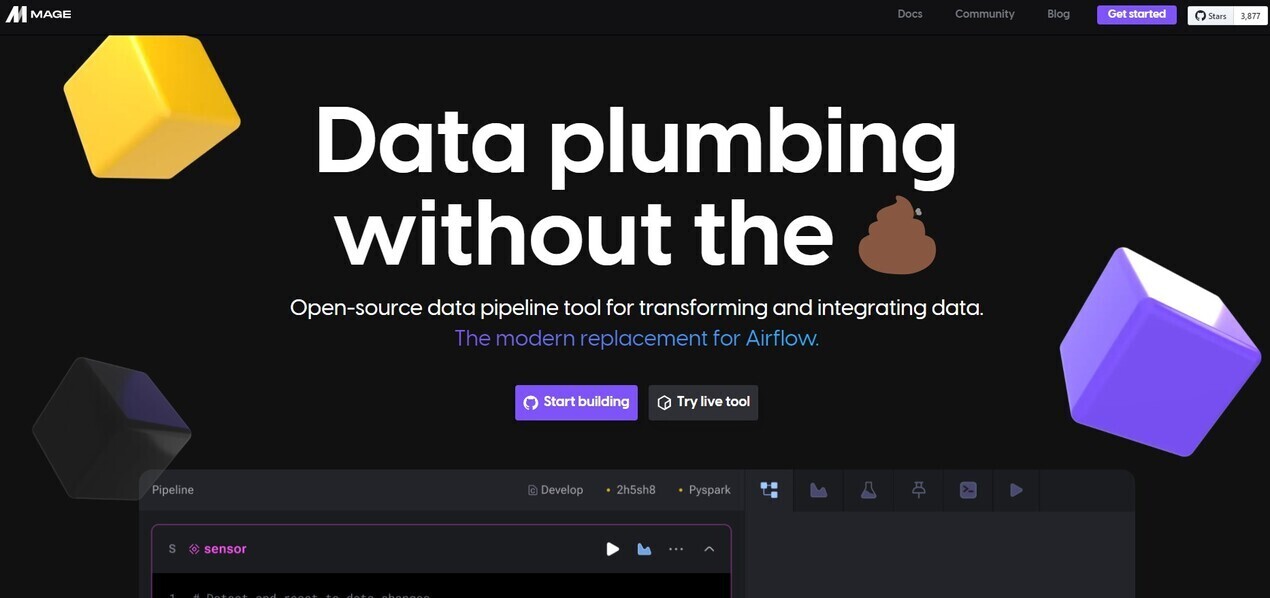
What is Mage?
Mage is an open-source data pipeline tool that allows users to transform and integrate data from various sources. It serves as a modern replacement for Airflow, offering an easy developer experience and the ability to build real-time and batch pipelines using Python, SQL, and R. With Mage, users can run, monitor, and orchestrate thousands of pipelines effortlessly.
Key Features:
1. Easy Developer Experience: Mage provides a user-friendly environment for developers to start building data pipelines quickly. Developers can begin locally with a single command or launch a development environment in the cloud using Terraform.
2. Language Flexibility: Users have the freedom to write code in Python, SQL, or R within the same data pipeline. This flexibility allows for ultimate customization based on individual preferences and project requirements.
3. Engineering Best Practices Built-In: Each step in the pipeline is contained within standalone files that contain modular code. This approach promotes reusability and testability while avoiding complex Directed Acyclic Graphs (DAGs) with spaghetti code.
Use Cases:
- Data Integration: Mage enables effortless integration and synchronization of data from third-party sources into existing systems.
- Real-Time Processing: Users can build real-time pipelines to process streaming data as it arrives.
- Batch Processing: The software supports batch processing for handling large volumes of data at scheduled intervals.
Conclusion:
Mage empowers data teams by providing them with magical powers through its intuitive interface and powerful features. With its easy developer experience, language flexibility, built-in engineering best practices, scalability options without dedicated infrastructure or DevOps teams overheads - Mage stands out among other tools like Airflow in terms of usability and functionality. Whether you are a data engineer or scientist looking to streamline your workflows or any other professional working with data - Mage offers value across various use cases by simplifying complex tasks associated with transforming and integrating diverse datasets efficiently

More information on Mage
Top 5 Countries
Traffic Sources
Mage Alternatives
Load more Alternatives-

Supercharge your productivity in Google Sheets with Mage AI. Save days on repetitive tasks, optimize your data, and streamline your workflow. Say goodbye to manual work and embrace efficient spreadsheet management. Try Mage AI now!
-

Turn transcripts into LinkedIn and Blog posts. For podcasters, agencies, VCs, and coaches who want more inbounds.
-

Magick is a no-code AI platform. Build, deploy & scale agents with ease. Visual node builder, open-source, platform agnostic. Ideal for gaming, customer support & marketing. No coding needed.
-

Create stunning visuals with ease using Mage Space, an AI creation platform powered by Stability AI. Generate images, videos, and 3D scenes effortlessly with cutting-edge AI models. Join the community today and unlock your creative potential!
-

Metaflow is a human-friendly Python library that makes it straightforward to develop, deploy, and operate various kinds of data-intensive applications, in particular those involving data science, ML, and AI.

![[dangao] [dangao]](/static/assets/comment/emotions/dangao.gif)
![[qiu] [qiu]](/static/assets/comment/emotions/qiu.gif)
![[fadou] [fadou]](/static/assets/comment/emotions/fadou.gif)
![[tiaopi] [tiaopi]](/static/assets/comment/emotions/tiaopi.gif)
![[fadai] [fadai]](/static/assets/comment/emotions/fadai.gif)
![[xinsui] [xinsui]](/static/assets/comment/emotions/xinsui.gif)
![[ruo] [ruo]](/static/assets/comment/emotions/ruo.gif)
![[jingkong] [jingkong]](/static/assets/comment/emotions/jingkong.gif)
![[quantou] [quantou]](/static/assets/comment/emotions/quantou.gif)
![[gangga] [gangga]](/static/assets/comment/emotions/gangga.gif)
![[da] [da]](/static/assets/comment/emotions/da.gif)
![[touxiao] [touxiao]](/static/assets/comment/emotions/touxiao.gif)
![[ciya] [ciya]](/static/assets/comment/emotions/ciya.gif)
![[liulei] [liulei]](/static/assets/comment/emotions/liulei.gif)
![[fendou] [fendou]](/static/assets/comment/emotions/fendou.gif)
![[kiss] [kiss]](/static/assets/comment/emotions/kiss.gif)
![[aoman] [aoman]](/static/assets/comment/emotions/aoman.gif)
![[kulou] [kulou]](/static/assets/comment/emotions/kulou.gif)
![[yueliang] [yueliang]](/static/assets/comment/emotions/yueliang.gif)
![[lenghan] [lenghan]](/static/assets/comment/emotions/lenghan.gif)
![[kun] [kun]](/static/assets/comment/emotions/kun.gif)
![[meng] [meng]](/static/assets/comment/emotions/meng.gif)
![[shenma] [shenma]](/static/assets/comment/emotions/shenma.gif)
![[peifu] [peifu]](/static/assets/comment/emotions/peifu.gif)
![[qinqin] [qinqin]](/static/assets/comment/emotions/qinqin.gif)
![[nanguo] [nanguo]](/static/assets/comment/emotions/nanguo.gif)
![[hufen] [hufen]](/static/assets/comment/emotions/hufen.gif)
![[shuai] [shuai]](/static/assets/comment/emotions/shuai.gif)
![[jingya] [jingya]](/static/assets/comment/emotions/jingya.gif)
![[cahan] [cahan]](/static/assets/comment/emotions/cahan.gif)
![[shengli] [shengli]](/static/assets/comment/emotions/shengli.gif)
![[qioudale] [qioudale]](/static/assets/comment/emotions/qioudale.gif)
![[cheer] [cheer]](/static/assets/comment/emotions/cheer.gif)
![[ketou] [ketou]](/static/assets/comment/emotions/ketou.gif)
![[shandian] [shandian]](/static/assets/comment/emotions/shandian.gif)
![[haqian] [haqian]](/static/assets/comment/emotions/haqian.gif)
![[jidong] [jidong]](/static/assets/comment/emotions/jidong.gif)
![[zaijian] [zaijian]](/static/assets/comment/emotions/zaijian.gif)
![[kafei] [kafei]](/static/assets/comment/emotions/kafei.gif)
![[love] [love]](/static/assets/comment/emotions/love.gif)
![[pizui] [pizui]](/static/assets/comment/emotions/pizui.gif)
![[huitou] [huitou]](/static/assets/comment/emotions/huitou.gif)
![[tiao] [tiao]](/static/assets/comment/emotions/tiao.gif)
![[liwu] [liwu]](/static/assets/comment/emotions/liwu.gif)
![[zhutou] [zhutou]](/static/assets/comment/emotions/zhutou.gif)
![[e] [e]](/static/assets/comment/emotions/e.gif)
![[qiang] [qiang]](/static/assets/comment/emotions/qiang.gif)
![[youtaiji] [youtaiji]](/static/assets/comment/emotions/youtaiji.gif)
![[zuohengheng] [zuohengheng]](/static/assets/comment/emotions/zuohengheng.gif)
![[huaixiao] [huaixiao]](/static/assets/comment/emotions/huaixiao.gif)
![[gouyin] [gouyin]](/static/assets/comment/emotions/gouyin.gif)
![[keai] [keai]](/static/assets/comment/emotions/keai.gif)
![[tiaosheng] [tiaosheng]](/static/assets/comment/emotions/tiaosheng.gif)
![[daku] [daku]](/static/assets/comment/emotions/daku.gif)
![[weiqu] [weiqu]](/static/assets/comment/emotions/weiqu.gif)
![[lanqiu] [lanqiu]](/static/assets/comment/emotions/lanqiu.gif)
![[zhemo] [zhemo]](/static/assets/comment/emotions/zhemo.gif)
![[xia] [xia]](/static/assets/comment/emotions/xia.gif)
![[fan] [fan]](/static/assets/comment/emotions/fan.gif)
![[yun] [yun]](/static/assets/comment/emotions/yun.gif)
![[youhengheng] [youhengheng]](/static/assets/comment/emotions/youhengheng.gif)
![[chong] [chong]](/static/assets/comment/emotions/chong.gif)
![[pijiu] [pijiu]](/static/assets/comment/emotions/pijiu.gif)
![[dajiao] [dajiao]](/static/assets/comment/emotions/dajiao.gif)
![[dao] [dao]](/static/assets/comment/emotions/dao.gif)
![[diaoxie] [diaoxie]](/static/assets/comment/emotions/diaoxie.gif)
![[liuhan] [liuhan]](/static/assets/comment/emotions/liuhan.gif)
![[haha] [haha]](/static/assets/comment/emotions/haha.gif)
![[xu] [xu]](/static/assets/comment/emotions/xu.gif)
![[zhuakuang] [zhuakuang]](/static/assets/comment/emotions/zhuakuang.gif)
![[zhuanquan] [zhuanquan]](/static/assets/comment/emotions/zhuanquan.gif)
![[no] [no]](/static/assets/comment/emotions/no.gif)
![[ok] [ok]](/static/assets/comment/emotions/ok.gif)
![[feiwen] [feiwen]](/static/assets/comment/emotions/feiwen.gif)
![[taiyang] [taiyang]](/static/assets/comment/emotions/taiyang.gif)
![[woshou] [woshou]](/static/assets/comment/emotions/woshou.gif)
![[zuqiu] [zuqiu]](/static/assets/comment/emotions/zuqiu.gif)
![[xigua] [xigua]](/static/assets/comment/emotions/xigua.gif)
![[hua] [hua]](/static/assets/comment/emotions/hua.gif)
![[tu] [tu]](/static/assets/comment/emotions/tu.gif)
![[tiaowu] [tiaowu]](/static/assets/comment/emotions/tiaowu.gif)
![[ma] [ma]](/static/assets/comment/emotions/ma.gif)
![[baiyan] [baiyan]](/static/assets/comment/emotions/baiyan.gif)
![[zhadan] [zhadan]](/static/assets/comment/emotions/zhadan.gif)
![[weixiao] [weixiao]](/static/assets/comment/emotions/weixiao.gif)
![[wen] [wen]](/static/assets/comment/emotions/wen.gif)
![[dabing] [dabing]](/static/assets/comment/emotions/dabing.gif)
![[xianwen] [xianwen]](/static/assets/comment/emotions/xianwen.gif)
![[shuijiao] [shuijiao]](/static/assets/comment/emotions/shuijiao.gif)
![[yongbao] [yongbao]](/static/assets/comment/emotions/yongbao.gif)
![[kelian] [kelian]](/static/assets/comment/emotions/kelian.gif)
![[pingpang] [pingpang]](/static/assets/comment/emotions/pingpang.gif)
![[danu] [danu]](/static/assets/comment/emotions/danu.gif)
![[geili] [geili]](/static/assets/comment/emotions/geili.gif)
![[wabi] [wabi]](/static/assets/comment/emotions/wabi.gif)
![[kuaikule] [kuaikule]](/static/assets/comment/emotions/kuaikule.gif)
![[zuotaiji] [zuotaiji]](/static/assets/comment/emotions/zuotaiji.gif)
![[tuzi] [tuzi]](/static/assets/comment/emotions/tuzi.gif)
![[bishi] [bishi]](/static/assets/comment/emotions/bishi.gif)
![[caidao] [caidao]](/static/assets/comment/emotions/caidao.gif)
![[dabian] [dabian]](/static/assets/comment/emotions/dabian.gif)
![[fanu] [fanu]](/static/assets/comment/emotions/fanu.gif)
![[guzhang] [guzhang]](/static/assets/comment/emotions/guzhang.gif)
![[se] [se]](/static/assets/comment/emotions/se.gif)
![[chajin] [chajin]](/static/assets/comment/emotions/chajin.gif)
![[bizui] [bizui]](/static/assets/comment/emotions/bizui.gif)
![[deyi] [deyi]](/static/assets/comment/emotions/deyi.gif)
![[ku] [ku]](/static/assets/comment/emotions/ku.gif)
![[huishou] [huishou]](/static/assets/comment/emotions/huishou.gif)
![[yinxian] [yinxian]](/static/assets/comment/emotions/yinxian.gif)
![[haixiu] [haixiu]](/static/assets/comment/emotions/haixiu.gif)